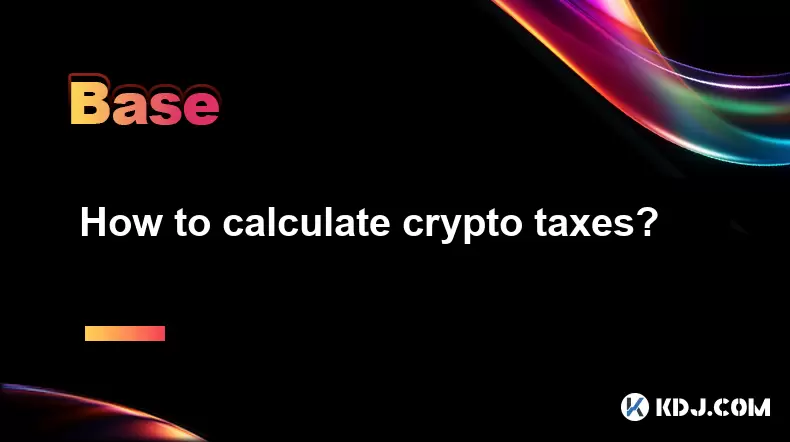-
 bitcoin
bitcoin $87959.907984 USD
1.34% -
 ethereum
ethereum $2920.497338 USD
3.04% -
 tether
tether $0.999775 USD
0.00% -
 xrp
xrp $2.237324 USD
8.12% -
 bnb
bnb $860.243768 USD
0.90% -
 solana
solana $138.089498 USD
5.43% -
 usd-coin
usd-coin $0.999807 USD
0.01% -
 tron
tron $0.272801 USD
-1.53% -
 dogecoin
dogecoin $0.150904 USD
2.96% -
 cardano
cardano $0.421635 USD
1.97% -
 hyperliquid
hyperliquid $32.152445 USD
2.23% -
 bitcoin-cash
bitcoin-cash $533.301069 USD
-1.94% -
 chainlink
chainlink $12.953417 USD
2.68% -
 unus-sed-leo
unus-sed-leo $9.535951 USD
0.73% -
 zcash
zcash $521.483386 USD
-2.87%
暗号税を計算する方法は?
Cryptocurrency transactions like selling, trading, or spending can trigger taxable events, requiring accurate reporting to avoid penalties.
2025/07/08 10:00

暗号通貨課税の基本を理解する
暗号通貨課税は、デジタル資産と規制の枠組みの進化性のために複雑になる可能性があります。米国を含む多くの管轄区域では、暗号は通貨ではなく税務上の財産として扱われます。この分類は、キャピタルゲインと損失が株式または不動産に同様に適用されることを意味します。暗号通貨を処分するたびに、販売、取引、支出を通じて、課税対象のイベントを引き起こす可能性があります。
IRS(内国歳入庁)のような政府は、個人が年間納税申告書のすべての暗号取引を報告することを要求しています。そうしないと、罰則、監査、または法的結果が生じる可能性があります。課税対象のイベントを構成するものと、関連する利益または損失を正確に計算する方法を理解することが重要です。
暗号取引での課税イベントの特定
すべての暗号取引が課税対象となるわけではありませんが、ほとんどの税務当局によっていくつかのアクションが課税イベントと見なされます。これらには以下が含まれます:
- フィアット通貨の暗号通貨の販売(例:USD)
- ある暗号通貨を別の暗号通貨と交換します(例:btcからeth)
- 暗号を使用して商品やサービスを購入します
- 収入として暗号を受け取る(例:給与、ステーキング報酬、エアドロップ)
これらの各シナリオには、慎重な追跡とドキュメントが必要です。たとえば、フリーランスの仕事の支払いとしてBitcoinを受け取った場合、受け取った日付の公正市場価値で通常の収入として課税されます。同様に、イーサリアムをソラナと交換する場合、イーサリアムを取得したときとそれを取引したときの間の価値の差に基づいて、キャピタルゲインまたは損失を計算する必要があります。
必要なトランザクションデータを収集します
暗号税を正しく計算するには、すべての取引の詳細な記録が必要です。重要なデータポイントには次のものがあります。
- 買収日(暗号を購入または受け取ったとき)
- コストベース(暗号を取得するために料金を含む支払った金額)
- 処分日(暗号を販売、取引、または費やした場合)
- 収益(FiatまたはCrypto Valueでの処分から受け取った金額)
多くのユーザーは、このプロセスを自動化するために、Cointracking、Koinly、Crypto.com税などのCrypto税ソフトウェアを利用しています。これらのプラットフォームは、取引所やウォレットと統合して、トランザクション履歴をインポートし、利益/損失を計算し、税報告書を生成します。ただし、特にトランザクションが少ないユーザーでは、スプレッドシートを使用した手動追跡も可能です。
キャピタルゲインと損失の計算
キャピタルゲインまたは損失を計算するための式は簡単です。
キャピタルゲイン/損失=収益 - コストベースたとえば、2,000ドルで1つのETHを購入し、後に3,000ドルで販売した場合、キャピタルゲインは1,000ドルになります。販売前に1年以上資産を保持している場合、通常、短期レートよりも低い長期キャピタルゲインレートの資格があります。保有期間は、納税義務を決定する際に重要です。
国によって、コストベースの方法に関するさまざまなルールがあります。一般的なアプローチには次のものがあります。
- ファーストイン、ファーストアウト(FIFO):最初に最古のコインを販売すると仮定します
- ラストイン、ファーストアウト(LIFO):最初に最新のコインを販売すると仮定します
- 具体的な識別:どのコインが販売されたかを正確に選択できます
適切な方法を選択すると、全体的な納税義務に影響を与える可能性があるため、管轄権が許可する方法と状況に最も有益な方法を理解することが重要です。
公式フォームの暗号税の報告
米国では、納税者はフォーム1040の質問に答えて、年間に仮想通貨取引に従事しているかどうかを尋ねる必要があります。 Cryptoのみを持っていて、取引しなかったとしても、「はい」と答えることは、ローカルのガイダンスに応じて依然として必要になる場合があります。
さらに、スケジュールDとフォーム8949は、暗号取引からのキャピタルゲインと損失を報告するために使用されます。フォーム8949は、日付、収益、コストベース、利益/損失額など、各販売または交換の詳細な内訳を提供します。税務当局との将来の合併症を避けるためには、正確な報告が不可欠です。
一部のプラットフォームは、ターボタックスやタックスアククトなどの税務ソフトウェアに直接インポートできる事前に満たされた税務フォームまたは要約を提供しています。特に年間を通じて複数の交換またはウォレットを使用している場合は、自動レポートの精度を常に再確認してください。
よくある質問(FAQ)
Q:暗号を購入しただけで何も販売しなかった場合、税金を借りていますか? A:販売や廃棄せずに暗号を保持するだけでは、一般に課税対象のイベントをトリガーしません。ただし、収入として暗号を受け取ったり、財布間を移転することは、管轄区域に応じて税の影響を及ぼす可能性があります。
Q:税務上の目的で暗号からクリプトへの取引を処理するにはどうすればよいですか? A:ある暗号通貨から別の暗号通貨への各取引は、元の資産の処分と見なされます。取引時の元の資産の価値に基づいて、利益または損失を計算する必要があります。
Q:暗号投資でお金を失った場合はどうなりますか? A:キャピタルロスを使用して、キャピタルゲインを相殺できます。あなたの損失があなたの利益を超えた場合、あなたはあなたの国の税法に応じて、あなたの通常の収入から一定の金額まで控除することができます。
Q:自分の財布の間で暗号を移動することに税の影響はありますか? A:個人的に制御する財布の間に暗号を転送することは、一般に課税対象のイベントではありません。処分は発生していないため、利益や損失は認識されません。
免責事項:info@kdj.com
提供される情報は取引に関するアドバイスではありません。 kdj.com は、この記事で提供される情報に基づいて行われた投資に対して一切の責任を負いません。暗号通貨は変動性が高いため、十分な調査を行った上で慎重に投資することを強くお勧めします。
このウェブサイトで使用されているコンテンツが著作権を侵害していると思われる場合は、直ちに当社 (info@kdj.com) までご連絡ください。速やかに削除させていただきます。
- マイケル・セイラー氏の540億ドルのビットコインギャンブル、仮想通貨情勢の変化の中で成熟度の壁に直面
- 2026-02-03 09:45:01
- MYXは市場低迷の中でも上昇したが、勢いの持続には懸念が残る
- 2026-02-03 06:55:02
- カスパの0.03ドルの瀬戸際:あるアナリストがファンダメンタルズに10万ドル賭けるか、それとも破綻するか
- 2026-02-03 07:00:01
- Sleep Token Drummer II がグラミー賞ノミネートとアルバム成功の中で Drumeo アワードを独占
- 2026-02-03 07:40:02
- トレビの泉の新たな現実: 入場料はコイン投げ以上のもの
- 2026-02-03 08:20:01
- UAEがAEコインを解放:ステーブルコインパワーによる政府支払いの新時代
- 2026-02-03 08:15:02
関連知識

暗号通貨とブロックチェーン技術の将来はどうなるでしょうか?
2026-01-11 21:19:34
分散型金融の進化1. DeFiプロトコルは、単純な貸し借りを超えて、仕組み商品、保険メカニズム、デリバティブ取引を含むように拡大しました。 2. スマート コントラクトの監査はより厳格になり、主要なプロトコルの立ち上げでは複数の企業による検証プロセスが標準になりました。 3. クロスチェーン相互運用...

サトシ・ナカモトとは誰ですか? (Bitcoinの作成者)
2026-01-12 07:00:05
ペンネームの由来1. サトシ・ナカモトは、Bitcoin を開発し、オリジナルのホワイトペーパーを執筆し、最初の実装を設計および展開した個人またはグループによって使用される名前です。 2. この名前が初めて登場したのは、2008 年に「Bitcoin: ピアツーピア電子キャッシュ システム」というタ...

暗号エアドロップとは何ですか?またその入手方法は何ですか?
2026-01-22 14:39:35
暗号エアドロップを理解する1. 暗号エアドロップは、複数のウォレットアドレスに無料のトークンまたはコインを配布することであり、通常、認知度を高め、初期のサポーターに報酬を与え、トークン所有権を分散させるためにブロックチェーンプロジェクトによって開始されます。 2. これらの配布は前払い費用なしで行う...

DeFiにおける永久損失とは何ですか?またそれを回避する方法は何ですか?
2026-01-13 11:59:34
永久損失を理解する1. 永久損失は、自動マーケットメーカー (AMM) の流動性プールに預けられたトークンの価値が、外部で保有されていた場合の価値と乖離した場合に発生します。 2. この現象は、ほとんどの AMM で使用される一定の積式が原因で発生します。プール内のトークン価格の比率は、外部市場価格...

異なるブロックチェーン間で暗号資産を橋渡しするにはどうすればよいでしょうか?
2026-01-14 18:19:42
クロスチェーンブリッジのメカニズム1. アトミック スワップにより、公平性とファイナリティを保証するハッシュ タイムロック契約に依存し、仲介者を介さずに 2 つのブロックチェーン間で資産を直接ピアツーピア交換できるようになります。 2. 信頼できるブリッジは、宛先チェーン上でユーザーのデポジットとミ...

ホワイトペーパーとは何ですか? ホワイトペーパーの読み方は何ですか?
2026-01-12 07:19:48
ホワイトペーパーの構造を理解する1. 暗号通貨分野のホワイトペーパーは、ブロックチェーン プロジェクトの目的、アーキテクチャ、仕組みを概説する基礎的な技術的および概念的な文書として機能します。 2. 通常、プロジェクトが解決しようとしている問題と提案された解決策を紹介する要約または要旨で始まります。...

暗号通貨とブロックチェーン技術の将来はどうなるでしょうか?
2026-01-11 21:19:34
分散型金融の進化1. DeFiプロトコルは、単純な貸し借りを超えて、仕組み商品、保険メカニズム、デリバティブ取引を含むように拡大しました。 2. スマート コントラクトの監査はより厳格になり、主要なプロトコルの立ち上げでは複数の企業による検証プロセスが標準になりました。 3. クロスチェーン相互運用...

サトシ・ナカモトとは誰ですか? (Bitcoinの作成者)
2026-01-12 07:00:05
ペンネームの由来1. サトシ・ナカモトは、Bitcoin を開発し、オリジナルのホワイトペーパーを執筆し、最初の実装を設計および展開した個人またはグループによって使用される名前です。 2. この名前が初めて登場したのは、2008 年に「Bitcoin: ピアツーピア電子キャッシュ システム」というタ...

暗号エアドロップとは何ですか?またその入手方法は何ですか?
2026-01-22 14:39:35
暗号エアドロップを理解する1. 暗号エアドロップは、複数のウォレットアドレスに無料のトークンまたはコインを配布することであり、通常、認知度を高め、初期のサポーターに報酬を与え、トークン所有権を分散させるためにブロックチェーンプロジェクトによって開始されます。 2. これらの配布は前払い費用なしで行う...

DeFiにおける永久損失とは何ですか?またそれを回避する方法は何ですか?
2026-01-13 11:59:34
永久損失を理解する1. 永久損失は、自動マーケットメーカー (AMM) の流動性プールに預けられたトークンの価値が、外部で保有されていた場合の価値と乖離した場合に発生します。 2. この現象は、ほとんどの AMM で使用される一定の積式が原因で発生します。プール内のトークン価格の比率は、外部市場価格...

異なるブロックチェーン間で暗号資産を橋渡しするにはどうすればよいでしょうか?
2026-01-14 18:19:42
クロスチェーンブリッジのメカニズム1. アトミック スワップにより、公平性とファイナリティを保証するハッシュ タイムロック契約に依存し、仲介者を介さずに 2 つのブロックチェーン間で資産を直接ピアツーピア交換できるようになります。 2. 信頼できるブリッジは、宛先チェーン上でユーザーのデポジットとミ...

ホワイトペーパーとは何ですか? ホワイトペーパーの読み方は何ですか?
2026-01-12 07:19:48
ホワイトペーパーの構造を理解する1. 暗号通貨分野のホワイトペーパーは、ブロックチェーン プロジェクトの目的、アーキテクチャ、仕組みを概説する基礎的な技術的および概念的な文書として機能します。 2. 通常、プロジェクトが解決しようとしている問題と提案された解決策を紹介する要約または要旨で始まります。...
すべての記事を見る










































































